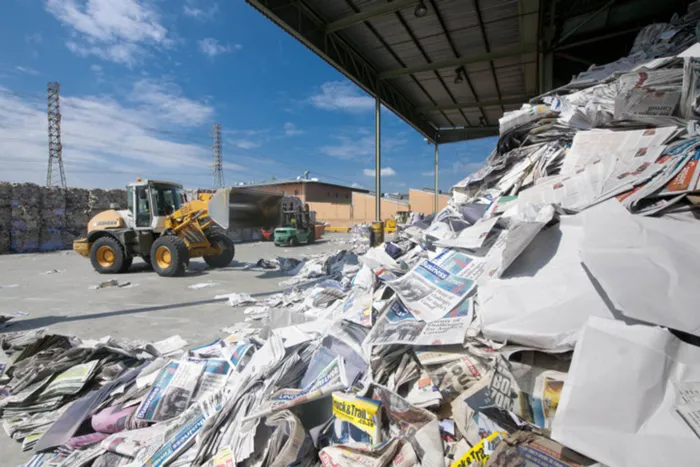Mpact maintains interim dividend despite lower profits and challenging market conditions
Industrial

Daily operations at an Mpact recycling plant include the sorting, shredding and packing of material. Some plastics can also be recycled. Paper and plastics packaging group and recycler Mpact's headline earnings fell in the six months to June 30, but it has predicted a much strong second half even though the South African economy was unlikely to improve materially.
Image: Supplied
South Africa’s biggest paper and plastics packaging business and recycler Mpact maintained its interim dividend at 30 cents a share despite lower profit as it is confident of an improved performance in the second half.
This was according to financial director Hannes Snyman, who, along with CEO Bruce Strong, was interviewed at the release of the results for the six months to June 30. Underlying earnings before interest, depreciation and amortisation fell by 14.5% to R625 million and operating profit lower by 25.5% to R315m. Headline earnings per share decreased to 93 cents from 128.1 cents.
Strong said the lower earnings were primarily the result of persistent and lagging demand in South Africa due to the weak macroeconomic environment, traditionally lower sales in the first half in the plastics business, and product optimisation in the PET conversion and closure plant, which had led to additional costs.
He said they continued to face a persistently challenging trading environment. The general economy remained subdued, despite lower interest rates and inflation, while uncertainty across local and global markets negatively impacted business confidence.
And while they did not expect to be seriously impacted by higher US import tariffs, there might be secondary impacts further into the future, such as, for example, as it pertains to other South African manufactured exports, said Strong.
During the six-month period, good volume growth was realised in containerboard and fruit packaging - these were two sectors in particular, that the group had focused on in its strategy of growing and investing in innovative, higher-margin, and sustainable products.
But these gains, however, were offset by declines in industrial sales volumes due to portfolio optimisation and depressed consumer demand.
Progress on capital projects continued. At the R1.3 billion upgrade at the Mkhondo mill, commissioning of the sodium lignosulphonate (SLS) plant was completed, and the pulp mill upgrade was in its final stage of construction.
The pulp mill would be commissioned in the third quarter of this year, said Strong. Thereafter, several months would be required to optimise both plants to reach design specifications and conduct SLS customer trials.
In the first half, the paper business was impacted by the global cyclical downturn in the paper industry, which led to lower margins, as selling prices decreased more than input costs, particularly due to higher local recovered paper prices.
Local and export containerboard volumes grew due to the competitive position of the Felixton paper mill. Fruit sector demand was up, with good growth in plastic crates and citrus cartons partially offset by lower sales volumes in banana and avocado cartons. “We anticipate continued growth in the agricultural sector in the second half,” said Strong.
The industrial market remained weak, impacting the Springs mill, the Paper Converting business, and beverage crates. The FMCG Wadeville’s volume fell significantly following expiry of two supply contracts with a major customer.
Paper business increased 6.9% to R5.4bn, due to a 5.9% increase in sales volumes and a 1% increase in average selling price. Gross profit was in line with the prior period.
The Recycling business increased collection volumes. Recovered paper prices were up significantly due to continued export demand, especially from India.
Paper Manufacturing increased containerboard sales volumes by 20.3% following interventions at the end of 2024 to increase exports and displace imports.
Cartonboard sales volumes from the Springs paper mill fell by 9.5% due to subdued local market conditions and import competition. The Springs mill took 15 days of commercial downtime in the current period to manage stock levels. In addition, the mill incurred 18 days of downtime due to external utility supply interruptions.
Revenue in the Plastics business decreased by 14.7% to R936m. The group expected an improved full-year result from the Plastics business compared to the prior year.
Visit:www.businessreport.co.za